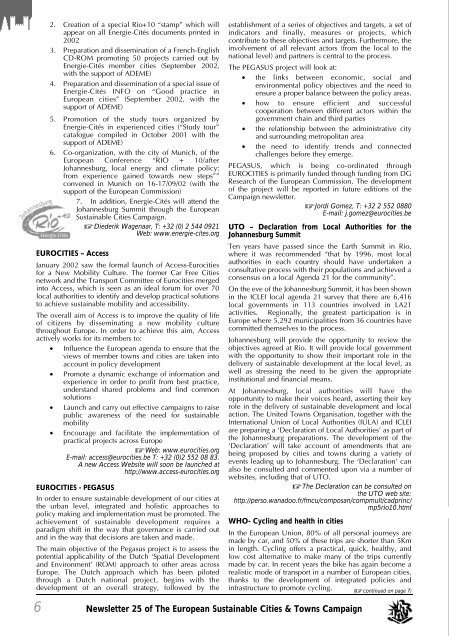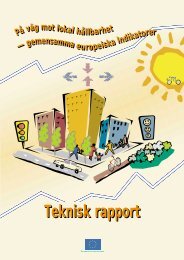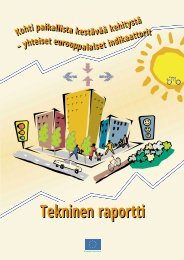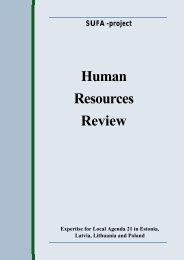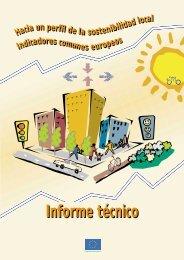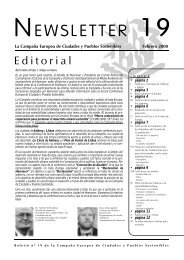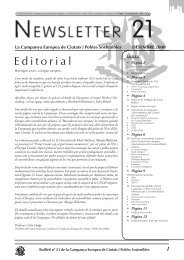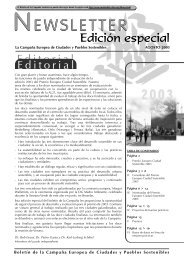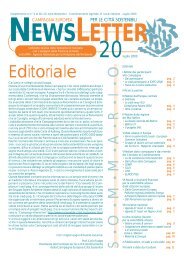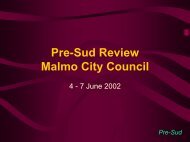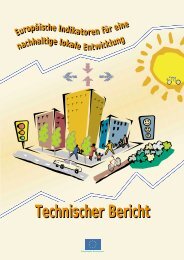the european sustainable cities and towns campaign
the european sustainable cities and towns campaign
the european sustainable cities and towns campaign
You also want an ePaper? Increase the reach of your titles
YUMPU automatically turns print PDFs into web optimized ePapers that Google loves.
mFN<br />
2. Creation of a special Rio+10 “stamp” which will<br />
appear on all Energie-Cités documents printed in<br />
2002<br />
3. Preparation <strong>and</strong> dissemination of a French-English<br />
CD-ROM promoting 50 projects carried out by<br />
Energie-Cités member <strong>cities</strong> (September 2002,<br />
with <strong>the</strong> support of ADEME)<br />
4. Preparation <strong>and</strong> dissemination of a special issue of<br />
Energie-Cités INFO on “Good practice in<br />
European <strong>cities</strong>” (September 2002, with <strong>the</strong><br />
support of ADEME)<br />
5. Promotion of <strong>the</strong> study tours organized by<br />
Energie-Cités in experienced <strong>cities</strong> (“Study tour”<br />
catalogue compiled in October 2001 with <strong>the</strong><br />
support of ADEME)<br />
6. Co-organization, with <strong>the</strong> city of Munich, of <strong>the</strong><br />
European Conference “RIO + 10/after<br />
Johannesburg, local energy <strong>and</strong> climate policy:<br />
from experience gained towards new steps””<br />
convened in Munich on 16-17/09/02 (with <strong>the</strong><br />
support of <strong>the</strong> European Commission)<br />
7. In addition, Energie-Cités will attend <strong>the</strong><br />
Johannesburg Summit through <strong>the</strong> European<br />
Sustainable Cities Campaign.<br />
pDiederik Wagenaar, T: +32 (0) 2 544 0921<br />
Web: www.energie-cites.org<br />
EUROCITIES – Access<br />
January 2002 saw <strong>the</strong> formal launch of Access-Euro<strong>cities</strong><br />
for a New Mobility Culture. The former Car Free Cities<br />
network <strong>and</strong> <strong>the</strong> Transport Committee of Euro<strong>cities</strong> merged<br />
into Access, which is seen as an ideal forum for over 70<br />
local authorities to identify <strong>and</strong> develop practical solutions<br />
to achieve <strong>sustainable</strong> mobility <strong>and</strong> accessibility.<br />
The overall aim of Access is to improve <strong>the</strong> quality of life<br />
of citizens by disseminating a new mobility culture<br />
throughout Europe. In order to achieve this aim, Access<br />
actively works for its members to:<br />
• Influence <strong>the</strong> European agenda to ensure that <strong>the</strong><br />
views of member <strong>towns</strong> <strong>and</strong> <strong>cities</strong> are taken into<br />
account in policy development<br />
• Promote a dynamic exchange of information <strong>and</strong><br />
experience in order to profit from best practice,<br />
underst<strong>and</strong> shared problems <strong>and</strong> find common<br />
solutions<br />
• Launch <strong>and</strong> carry out effective <strong>campaign</strong>s to raise<br />
public awareness of <strong>the</strong> need for <strong>sustainable</strong><br />
mobility<br />
• Encourage <strong>and</strong> facilitate <strong>the</strong> implementation of<br />
practical projects across Europe<br />
pWeb: www.euro<strong>cities</strong>.org<br />
E-mail: access@euro<strong>cities</strong>.be T: +32 (0)2 552 08 83.<br />
A new Access Website will soon be launched at<br />
http://www.access-euro<strong>cities</strong>.org<br />
EUROCITIES - PEGASUS<br />
In order to ensure <strong>sustainable</strong> development of our <strong>cities</strong> at<br />
<strong>the</strong> urban level, integrated <strong>and</strong> holistic approaches to<br />
policy making <strong>and</strong> implementation must be promoted. The<br />
achievement of <strong>sustainable</strong> development requires a<br />
paradigm shift in <strong>the</strong> way that governance is carried out<br />
<strong>and</strong> in <strong>the</strong> way that decisions are taken <strong>and</strong> made.<br />
The main objective of <strong>the</strong> Pegasus project is to assess <strong>the</strong><br />
potential applicability of <strong>the</strong> Dutch ‘Spatial Development<br />
<strong>and</strong> Environment’ (ROM) approach to o<strong>the</strong>r areas across<br />
Europe. The Dutch approach which has been piloted<br />
through a Dutch national project, begins with <strong>the</strong><br />
development of an overall strategy, followed by <strong>the</strong><br />
establishment of a series of objectives <strong>and</strong> targets, a set of<br />
indicators <strong>and</strong> finally, measures or projects, which<br />
contribute to <strong>the</strong>se objectives <strong>and</strong> targets. Fur<strong>the</strong>rmore, <strong>the</strong><br />
involvement of all relevant actors (from <strong>the</strong> local to <strong>the</strong><br />
national level) <strong>and</strong> partners is central to <strong>the</strong> process.<br />
The PEGASUS project will look at:<br />
• <strong>the</strong> links between economic, social <strong>and</strong><br />
environmental policy objectives <strong>and</strong> <strong>the</strong> need to<br />
ensure a proper balance between <strong>the</strong> policy areas.<br />
• how to ensure efficient <strong>and</strong> successful<br />
cooperation between different actors within <strong>the</strong><br />
government chain <strong>and</strong> third parties<br />
• <strong>the</strong> relationship between <strong>the</strong> administrative city<br />
<strong>and</strong> surrounding metropolitan area<br />
• <strong>the</strong> need to identify trends <strong>and</strong> connected<br />
challenges before <strong>the</strong>y emerge.<br />
PEGASUS, which is being co-ordinated through<br />
EUROCITIES is primarily funded through funding from DG<br />
Research of <strong>the</strong> European Commission. The development<br />
of <strong>the</strong> project will be reported in future editions of <strong>the</strong><br />
Campaign newsletter.<br />
pJordi Gomez, T: +32 2 552 0880<br />
E-mail: j.gomez@euro<strong>cities</strong>.be<br />
UTO – Declaration from Local Authorities for <strong>the</strong><br />
Johannesburg Summit<br />
Ten years have passed since <strong>the</strong> Earth Summit in Rio,<br />
where it was recommended “that by 1996, most local<br />
authorities in each country should have undertaken a<br />
consultative process with <strong>the</strong>ir populations <strong>and</strong> achieved a<br />
consensus on a local Agenda 21 for <strong>the</strong> community”.<br />
On <strong>the</strong> eve of <strong>the</strong> Johannesburg Summit, it has been shown<br />
in <strong>the</strong> ICLEI local agenda 21 survey that <strong>the</strong>re are 6,416<br />
local governments in 113 countries involved in LA21<br />
activities. Regionally, <strong>the</strong> greatest participation is in<br />
Europe where 5,292 municipalities from 36 countries have<br />
committed <strong>the</strong>mselves to <strong>the</strong> process.<br />
Johannesburg will provide <strong>the</strong> opportunity to review <strong>the</strong><br />
objectives agreed at Rio. It will provide local government<br />
with <strong>the</strong> opportunity to show <strong>the</strong>ir important role in <strong>the</strong><br />
delivery of <strong>sustainable</strong> development at <strong>the</strong> local level, as<br />
well as stressing <strong>the</strong> need to be given <strong>the</strong> appropriate<br />
institutional <strong>and</strong> financial means.<br />
At Johannesburg, local authorities will have <strong>the</strong><br />
opportunity to make <strong>the</strong>ir voices heard, asserting <strong>the</strong>ir key<br />
role in <strong>the</strong> delivery of <strong>sustainable</strong> development <strong>and</strong> local<br />
action. The United Towns Organisation, toge<strong>the</strong>r with <strong>the</strong><br />
International Union of Local Authorities (IULA) <strong>and</strong> ICLEI<br />
are preparing a ‘Declaration of Local Authorities’ as part of<br />
<strong>the</strong> Johannesburg preparations. The development of <strong>the</strong><br />
‘Declaration’ will take account of amendments that are<br />
being proposed by <strong>cities</strong> <strong>and</strong> <strong>towns</strong> during a variety of<br />
events leading up to Johannesburg. The ‘Declaration’ can<br />
also be consulted <strong>and</strong> commented upon via a number of<br />
websites, including that of UTO.<br />
pThe Declaration can be consulted on<br />
<strong>the</strong> UTO web site:<br />
http://perso.wanadoo.fr/fmcu/composan/compmult/cadprinc/<br />
mp5rio10.html<br />
WHO- Cycling <strong>and</strong> health in <strong>cities</strong><br />
In <strong>the</strong> European Union, 80% of all personal journeys are<br />
made by car, <strong>and</strong> 50% of <strong>the</strong>se trips are shorter than 5Km<br />
in length. Cycling offers a practical, quick, healthy, <strong>and</strong><br />
low cost alternative to make many of <strong>the</strong> trips currently<br />
made by car. In recent years <strong>the</strong> bike has again become a<br />
realistic mode of transport in a number of European <strong>cities</strong>,<br />
thanks to <strong>the</strong> development of integrated policies <strong>and</strong><br />
infrastructure to promote cycling. (continued on page 7)<br />
6 Newsletter 25 of The European Sustainable Cities & Towns Campaign<br />
(pcontinued on page 7)


